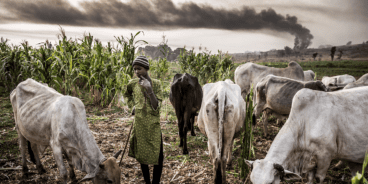
Atrocity Alert No. 21: Syria and South Sudan
Atrocity Alert is a weekly publication by the Global Centre for the Responsibility to Protect highlighting and updating situations where populations are at risk of, or are enduring, mass atrocity crimes.
Syria
On 6 September Syrian government forces were accused of dropping barrel bombs filled with chlorine gas on the Al-Sukari neighborhood in eastern Aleppo. These accusations come one week after the UN Security Council met to discuss the report of the UN-Organization for the Prohibition of Chemical Weapons (OPCW) Joint Investigation Mechanism (JIM) on responsibility for chemical weapons use in Syria, and less than a month since at least three people were killed during a reported chlorine attack on the opposition-held Zubdiya neighborhood of Aleppo on 10 August. It was reported that at least 70 people were injured during Tuesday’s attack, including women and children. The recent JIM report concluded that Syrian government forces had carried out at least two chemical weapons attacks since 2013. The use of chemical weapons constitutes a war crime and is in clear contravention of Security Council Resolution 2118, which threatened possible Chapter VII measures in the event of non-compliance.
The latest report of the Human Rights Council-mandated Commission of Inquiry (CoI) on Syria was published on 6 September. The CoI condemns the increase in indiscriminate attacks on civilians and medical facilities following the breakdown of February’s cessation of hostilities and asserts that “without a return to the peace process, the Syrian conflict, and the violations and abuses it has nourished, will continue.”
South Sudan
Following renewed fighting in Juba during July and the UN Security Council’s authorization of the deployment of a Regional Protection Force (RPF), South Sudan is at a critical juncture for the prevention of further mass atrocity crimes. The UN Security Council visited South Sudan from 2 to 5 September to discuss with government officials, UN representatives and civil society how to improve the security and humanitarian situation across the country. The Transitional Government of National Unity and UN Security Council members issued a Joint Communique on 4 September in which the government consented to the deployment of the RPF as part of the UN Mission in South Sudan (UNMISS). UN Security Council Resolution 2304 threatened an arms embargo on South Sudan if the government impeded the deployment of the RPF. Ensuring UNMISS’ free movement and establishing the Hybrid Court for South Sudan, in cooperation with the African Union, are other essential commitments that the Transitional Government of National Unity should uphold in order to prevent further atrocities.


Atrocity Alert No. 444: Nigeria, Haiti and South Sudan
